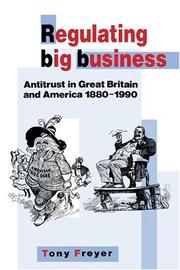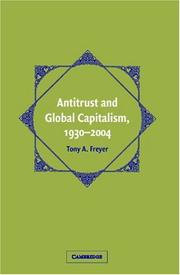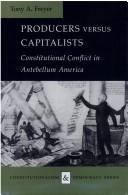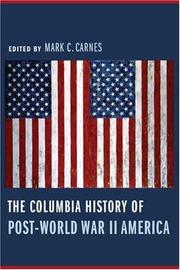| Listing 1 - 9 of 9 |
Sort by
|
Book
ISBN: 0814725686 9780814725689 Year: 1981 Publisher: New York, N.Y.,
Abstract | Keywords | Export | Availability | Bookmark
 Loading...
Loading...Choose an application
- Reference Manager
- EndNote
- RefWorks (Direct export to RefWorks)

ISBN: 052135207X 0521059747 0511582382 051100236X 9780521352079 9780511002366 9780511582387 9780521059749 Year: 1992 Publisher: Cambridge : Cambridge University Press,
Abstract | Keywords | Export | Availability | Bookmark
 Loading...
Loading...Choose an application
- Reference Manager
- EndNote
- RefWorks (Direct export to RefWorks)
In the late nineteenth century a new form of capitalism emerged in Great Britain and the United States. Before the revolutions in communication and transportation, the owners of firms managed the processes of production, distribution, transportation and communication personally. By the end of the century, however, technological innovation and mass markets fostered the development of large-scale corporate structures, leading to a separation between owners and operators. In this new form of capitalist enterprise managers were increasingly the principal decision makers. This economic transformation spawned social and political tensions which compelled the public and policy makers to decide upon an appropriate response to big business. A primary focus of public discourse was antitrust. This book explores the development of big business and the antitrust response in a comparative context.
Trade regulation --- Trusts, Industrial --- Antitrust law --- History. --- History of the United Kingdom and Ireland --- History of North America --- History of the law --- Foreign trade policy --- Economic law --- anno 1800-1999 --- United States --- Great Britain --- 347 <09> --- -Antitrust law --- -Trade regulation --- -Trusts, Industrial --- -Combinations, Industrial --- Combinations in restraint of trade --- Commercial corners --- Commercial trusts --- Corners, Commercial --- Economic concentration --- Industrial combinations --- Industrial groupings --- Industrial trusts --- Big business --- Capital --- Economics --- Cartels --- Competition --- Consolidation and merger of corporations --- Corporations --- Holding companies --- Monopolies --- Restraint of trade --- Regulation of trade --- Regulatory reform --- Commercial law --- Consumer protection --- Deregulation --- Anti-trust law --- Competition law --- 347 <09> Burgerlijk recht. Privaatrecht--Geschiedenis van ... --- Burgerlijk recht. Privaatrecht--Geschiedenis van ... --- History --- Law and legislation --- Law --- Combinations, Industrial --- Burgerlijk recht. Privaatrecht--Geschiedenis van .. --- Burgerlijk recht. Privaatrecht--Geschiedenis van . --- Business, Economy and Management --- Trade regulation - Great Britain - History. --- Trade regulation - United States - History. --- Trusts, Industrial - Great Britain - History. --- Trusts, Industrial - United States - History. --- Antitrust law - Great Britain - History. --- Antitrust law - United States - History. --- Burgerlijk recht. Privaatrecht--Geschiedenis van --- United States of America

ISBN: 9780521817882 9780511607189 9780521747271 0521817889 0511607180 051124150X 9780511241505 9780511242007 051124200X 0511240988 9780511240980 1280567724 9781280567728 9786610567720 6610567727 1107159296 0511240465 0511317921 0521747279 Year: 2006 Publisher: Cambridge ; New York : Cambridge University Press,
Abstract | Keywords | Export | Availability | Bookmark
 Loading...
Loading...Choose an application
- Reference Manager
- EndNote
- RefWorks (Direct export to RefWorks)
The international spread of antitrust suggested the historical process shaping global capitalism. By the 1930s, Americans feared that big business exceeded the government's capacity to impose accountability, engendering the most aggressive antitrust campaign in history. Meanwhile, big business had emerged to varying degrees in liberal Britain, Australia and France, Nazi Germany, and militarist Japan. These same nations nonetheless expressly rejected American-style antitrust as unsuited to their cultures and institutions. After World War II, however, governments in these nations - as well as the European Community - adopted workable antitrust regimes. By the millennium antitrust was instrumental to the clash between state sovereignty and globalization. What ideological and institutional factors explain the global change from opposing to supporting antitrust? Addressing this question, this book throws new light on the struggle over liberal capitalism during the Great Depression and World War II, the postwar Allied occupations of Japan and Germany, the reaction against American big-business hegemony during the Cold War, and the clash over globalization and the WTO.
Antitrust law --- -Antitrust law --- -Capitalism --- -Free enterprise --- -AA / International- internationaal --- US / United States of America - USA - Verenigde Staten - Etats Unis --- JP / Japan - Japon --- DE / Germany - Duitsland - Allemagne --- AU / Australia - Australië - Australie --- EEC / European Union - EU -Europese Unie - Union Européenne - UE --- 338.50 --- 338.45 --- 338.313 --- economie (internationaal) --- kapitalisme --- Anti-trust law --- Competition --- Competition law --- Trusts, Industrial --- Market economy --- Free markets --- Laissez-faire --- Markets, Free --- Private enterprise --- History --- Moral and ethical aspects --- Vormen van monopolistische orde (algemeenheden). Economisch malthusianisme --- Industriële autarkie. Economisch nationalisme. Verankering van vennootschappen --- Kapitalisme --- Law and legislation --- Law --- Capitalism --- Free enterprise --- 330.342.14 --- 338 <09> --- 347.7 --- Commercial law --- Trade regulation --- 330.342.14 Kapitalistische economie. Free enterprise. Markteconomie. Vrije concurrentie --- Kapitalistische economie. Free enterprise. Markteconomie. Vrije concurrentie --- 347.7 Handelsrecht --- Handelsrecht --- 338 <09> Economische geschiedenis --- Economische geschiedenis --- JAPAN -- 930.34 --- AUSTRALIA -- 930.34 --- EUROPE -- 930.34 --- USA -- 930.34 --- AA / International- internationaal --- History. --- Moral and ethical aspects. --- Arts and Humanities --- Antitrust law - History --- Antitrust law - United States - History --- Antitrust law - Japan - History --- Antitrust law - Europe - History --- Antitrust law - Australia - History --- Capitalism - Moral and ethical aspects --- Free enterprise - Moral and ethical aspects
Book
ISBN: 0585279659 9780585279657 0817304673 9780817304676 Year: 1990 Publisher: Tuscaloosa, Ala. : University of Alabama Press,
Abstract | Keywords | Export | Availability | Bookmark
 Loading...
Loading...Choose an application
- Reference Manager
- EndNote
- RefWorks (Direct export to RefWorks)
Judges --- Law - U.S. - General --- Law - U.S. --- Law, Politics & Government --- Alcaldes --- Cadis --- Chief justices --- Chief magistrates --- Justices --- Magistrates --- Courts --- Biography --- Congresses --- Legal status, laws, etc. --- Officials and employees --- Black, Hugo LaFayette, --- Black, Hugo L.
Book
Year: 1979 Publisher: Greenwich, Conn.
Abstract | Keywords | Export | Availability | Bookmark
 Loading...
Loading...Choose an application
- Reference Manager
- EndNote
- RefWorks (Direct export to RefWorks)
Book
Year: 1981 Publisher: [S.l.] : [s.n.],
Abstract | Keywords | Export | Availability | Bookmark
 Loading...
Loading...Choose an application
- Reference Manager
- EndNote
- RefWorks (Direct export to RefWorks)

ISBN: 0813914965 Year: 1994 Publisher: Charlottesville ; London University Press of Virginia
Abstract | Keywords | Export | Availability | Bookmark
 Loading...
Loading...Choose an application
- Reference Manager
- EndNote
- RefWorks (Direct export to RefWorks)
Book
ISBN: 0700620524 9780700620524 Year: 2014 Publisher: Lawrence, Kansas : University Press of Kansas,
Abstract | Keywords | Export | Availability | Bookmark
 Loading...
Loading...Choose an application
- Reference Manager
- EndNote
- RefWorks (Direct export to RefWorks)
"In the early years of the republic states exercised considerable power over immigrants and, in the case of southern states, free blacks by either assessing taxes on immigrants brought through their ports and, in southern states, excluding free blacks. Previously the Court held that persons were not part of commerce as defined in the Constitution and that the states' police power--to regulate who came to live in a state--could exist concurrently with the federal government's power over commerce and immigration. In the Passenger Cases the Supreme Court overruled these decisions, finding that state regulation of immigrants by assessing taxes was an unconstitutional interference with federal power under the commerce clause, extending the potential power of the national government under that clause. The Court ruled that persons could be part of commerce and subject to federal regulation, something that laid the groundwork for the Dred Scott decision in dealing with fugitive slaves. If persons are covered by the commerce clause then federal law regarding fugitive slaves could trump state law. And in the recent controversy over state regulation of immigration the cases remind us that states once exercised considerable power over who could immigrate in this country"-- "In 1849 Chief Justice Taney's Court delivered a 5-4 decision on the legal status of immigrants and free blacks under the federal commerce power. The closely divided decision, further emphasized by the fact there were eight opinions, played a part in the increasingly contested politics over growing immigration, and the controversies about fugitive slaves and the western expansion of slavery that resulted in the Compromise of 1850. In the decades after the Civil War federal regulation of immigration almost entirely displaced the role of the states. Yet, over a century later, Justice Scalia in Arizona v. US appealed to the era when states exercised greater control over who they allowed to cross their borders; a dissent which has returned the Passenger Cases to the contemporary relevance. The Passenger Cases provide a counter-history that allowed the Court to affirm federal supremacy and state-federal cooperation in Arizona I (2011) and II (2012). In The Passenger Cases and the Commerce Clause Tony Allan Freyer focuses on the antebellum Supreme Court's role prescribing state-federal regulation of immigrants, the movement of free blacks within the United States and on the origins, state court decisions, federal precedents, appellate arguments, and opinion-making that culminated in the Court's decision of the Passenger Cases. The Court's split decision provided political legitimacy for the 1850 Compromise: enactment of a stronger fugitive slave law, admission of slavery in western territories based on popular vote of residents (popular sovereignty), and the abolition of the slave trade in Washington D.C. The divided opinions in the Passenger Cases also influenced the immigrant and slavery crises which disrupted the balance between free and slave-labor states, culminating in the Civil War. The states did indeed enact laws enabling exclusion of undesirable white immigrants and free blacks. The 5-4 division of the Court anticipated the better known, but even more divisive, views of the Justices in the Dred Scott case (1857). And in considering the post-Reconstruction evolution of new standards by which to judge immigration issues, the Passenger Cases revealed the continuing controversy over how to treat those who wish to come to our country, even as federal law came to dominate the regulation of immigration. These issues continued to complicate immigration law as much today as they did more than a century and a half ago. The persistence of these problems suggested that a "decent respect to the opinions of mankind" continued to demand a coherent, humane, and more consistent immigration policy"--
Slavery --- States' rights (American politics) --- Emigration and immigration law --- Interstate commerce --- Law and legislation --- History --- United States. --- United States --- Commercial policy. --- History.


ISBN: 9780231511803 9780231121262 Year: 2007 Publisher: New York, N.Y. Columbia University Press
Abstract | Keywords | Export | Availability | Bookmark
 Loading...
Loading...Choose an application
- Reference Manager
- EndNote
- RefWorks (Direct export to RefWorks)
| Listing 1 - 9 of 9 |
Sort by
|

 Search
Search Feedback
Feedback About UniCat
About UniCat  Help
Help News
News